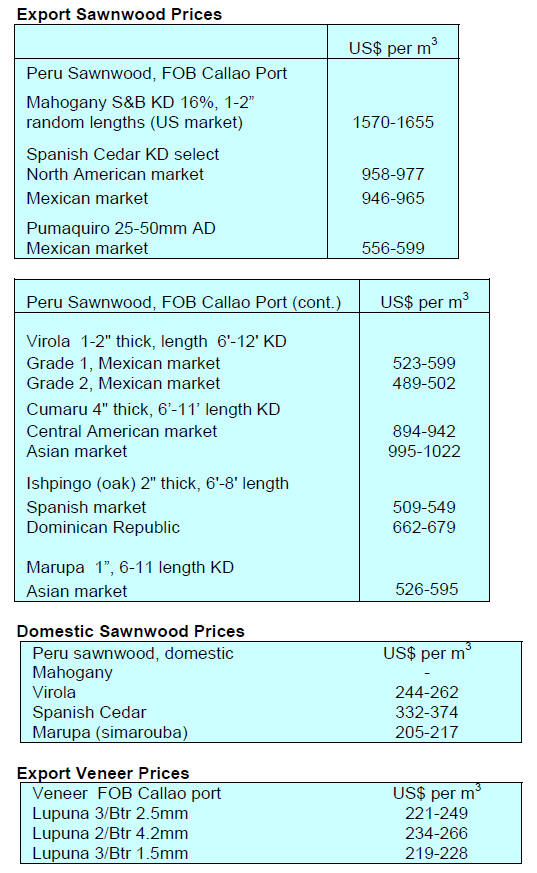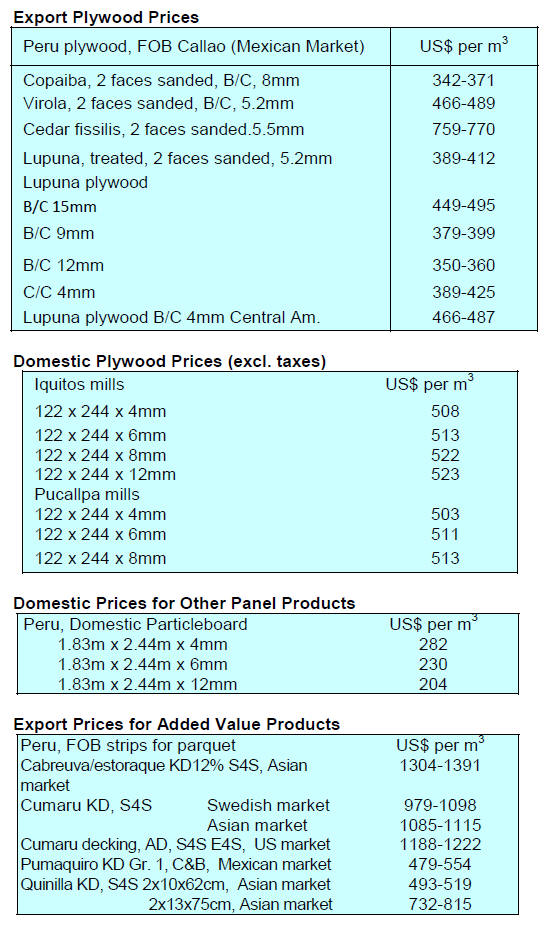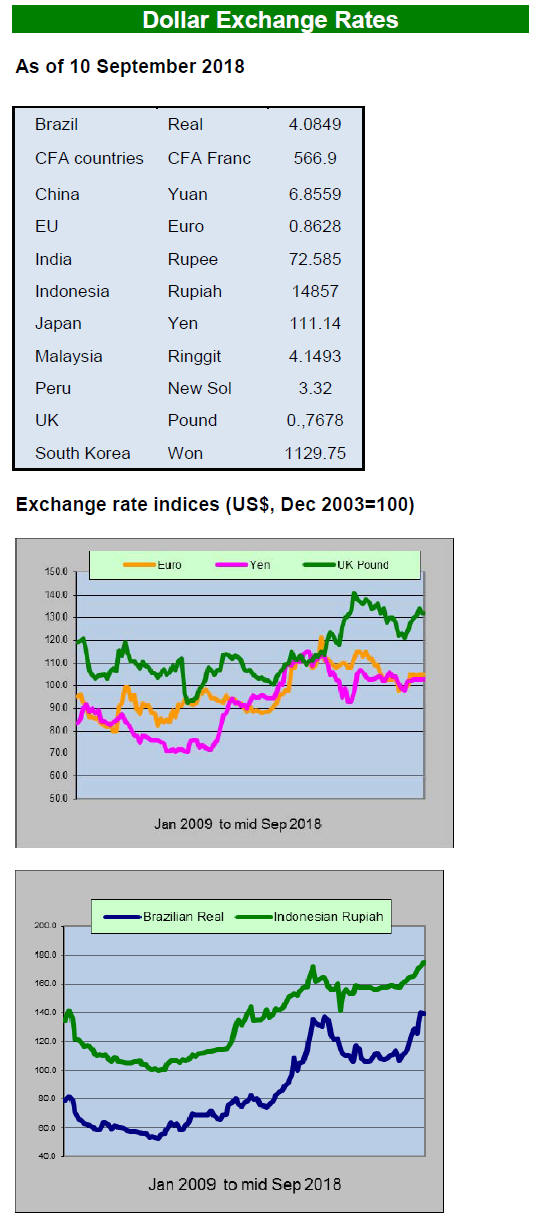2.
MALAYSIA
Staying in the top 10 global
furniture exporters
The Malaysian Timber Industry Board (MTIB) will host a
conference “Wood Based Furniture Design 2018:
Sustainable and Commercial” planned for 30 October in
Kuala Lumpur.
In promoting the conference the MTIB said the thrust in
the business community today is evolution and
diversification of businesses aiming for environmental and
financial sustainability.
The MTIB conference is aimed at acknowledging these
challenges so that Malaysian manufactures manage to
keep the country in the top 10 list of the furniture
exporters. More than 80% of Malaysia’s furniture exports
are wood based.
For more see:
http://www.mtib.gov.my/index.php?option=com_content&view=
article&id=2503%3Aconference-on-wood-based-furnituredesign-
2018-sustainable-acommercial&
catid=1%3Ahighlights&lang=en
The annual Malaysian International Furniture Fair (MIFF)
made history in 2018 according to the organisers. The fair,
held in March this year, was said to be the largest in
MIFF’s 24-year history. MIFF 2018 organisers say a 25%
increase in exhibition space was booked by exhibitors.
Apart from Malaysia, exhibitors came from China, Taiwan
P.o.C, Indonesia, Hong Kong, South Korea, Japan, India,
Turkey, Vietnam, Thailand, Singapore and the USA. Of
the products on show most were home furnishings (397
exhibitors), followed by office furniture (133) and fittings
and accessories (64). MIFF 2019 will run from March 8 to
11 and will be themed “Design Connects People.”
New Chief Conservator of Forests for Sabah
When meeting the press after his appointment the new
Sabah Chief Conservator of Forests for Sabah, Manshor
Mohd Jaini, said the State government’s new policies for
the forestry sector will require all stakeholders to adjust
and adapt to meet the aims of forest conservation in Sabah.
He said actions by the Forestry Department will now be
open and transparent and will focus on forest reserve
management and conservation. This will not be an easy
task according to Mashor as the Forestry Department is
responsible for management over more than 50% of
Sabah's land which has been gazetted as forest reserves,
protected areas and wildlife conservation areas.
Read more at
https://www.nst.com.my/news/nation/2018/09/409713/39-
million-hectares-sabah-land-earmarked-forest-reserve
Timber industry transformation plan for Sarawak – the
major challenge is lack of workers
The Sarawak government’s Deputy Chief Minister,
Awang Tengah Ali Hasan, has said the State government
is committed to securing a sustainable timber industry
because the sector contributes a lot to the state’s export
revenue. The minster said exports of wood products from
Sarawak last year were worth around RM47 million
compared to RM43 million in 2016.
2017 wood product exports comprised plywood (RM3.27
billion) or 53% of total wood product exports followed by
logs (RM1.21 billion) or 20% of exports, sawnwood
(RM803 million) or 13% and fibreboard (RM308 million)
or around 5%.
Despite this good performance the minister outlined the
need to move to the export of high-value wood products
and to support this transformation of the timber sector the
Sarawak Timber Industry Development Corporation has
developed a “Timber Industry Transformation Plan’ the
aim of which is to transform the industry from the current
dependence on exports of primary and secondary products
to one exporting high-value timber products by 2030.
One of the biggest challenges in seeing this plan become
reality is the lack of skilled labour. The youth in Sarawak
show no interest in working in the wood products sector
and Federal Government policies make it hard to hire
foreign workers.
This was taken up by the Malaysian Furniture Council
Secretary General, Albert Khoo, who called for consistent
policies for the hiring of foreign workers as a way to
ensure stable development in the furniture manufacturing
sector.
Read more at http://www.theborneopost.com/2018/09/04/lackof-
local-labour-skills-hamper-furniture-industry-mfc/
3.
INDONESIA
Import tariffs on downstream
products
Airlangga Hartarto, Indonesia’s Minister of Industry, has
said the government is planning to impose 7.5 to 10%
import tariffs on downstream products in an effort to curb
imports. For raw materials the import tariffs will be 2.5% .
The Indonesia media have reported that Airlangga said
tariffs on raw materials will be kept to a minimum.
He said the government planned to complete its list of
products that will attract higher tariffs during September
and that this is being done to improve the current account
deficit. The government has assessed 900 consumer goods
for which import tariffs would be increased.
See:
http://www.thejakartapost.com/news/2018/09/04/indonesia-toimpose-
up-to-10-percent-import-tariffs-on-downstreamproducts.
html
Sukuk – a possible source of funding to support
energy plantations
The development of forest-based renewable energy in
Indonesia requires financial support according to Agus
Justianto, Head of Research and Development Agency, in
the Ministry of Environment and Forestry. Some 89,860
ha. of bio-fuel plantations have been planted in Indonesia
and these are distributed over 10 industrial plantation
forests. In addition, there are 23 industrial plantation
concessions (HTI) units that are preparing to plant another
87,600 ha.
According to Agus, if the programme of blended biofuel
(B10) is successfully implemented there could be a
reduction in greenhouse gas emissions by 5 million tonnes
equivalent of C02.
The Head of the Sub-Directorate in the Ministry of
Finance Sharia State Securities Market Development, Dwi
Iriati Hadiningdyah, explained that green sukuk could be a
source of funding to support climate change control.
She explained that sukuk has become a source of ministry
of finance support. In the period 2008-2018, the total
issuance of sukuk reached Rp.925.2 trillion.
See: http://www.beritasatu.com/satu/507771-energi-terbarukanberbasis-
hutan-butuh-dukungan-pembiayaan.html
Furniture exports boosted by participation in
international fairs
The online ‘Indonesia Investments’ has quoted Abdul
Sobur, Secretary-General of the Indonesian Furniture and
Handicraft Industry Association (HIMKI) as saying in the
second quarter of 2018 Indonesia’s furniture exports
increased almost 11% year-on-year to US$$930 million.
Sobur said the increase was boosted by the participation of
Indonesian furniture manufacturers in furniture exhibitions
in Germany, France and China. As there are more
exhibitions scheduled this year Sobur encouraged
manufacturers to gear up and participate.
Sobur said as the rupiah gradually weakens against major
currencies Indonesian furniture exporters are getting a
boost from price competiveness especially as most raw
materials are sourced domestically.
In related news, Indonesian furniture products attracted
many visitors to the 2018 Spoga + Gafa Exhibition which
was held recently in Cologne. This event included
business-to-business meetings and promotion.
See:
https://www.indonesia-investments.com/news/newscolumns/
good-growth-indonesia-s-furniture-exports-in-2ndquarter-
2018/item8954
Duty-free to Australia
The recently signed Indonesia-Australia Comprehensive
Economic Cooperation (IA CEPA) opens the way for
some 7,000 Indonesian export products to enter Australia
tariff free according to Ni Made Ayu Marthini, Bilateral
Trade Director in the Ministry of Trade.
Products exempted include textile products, herbicides,
pesticides, wood products, coffee, chocolate, paper and
machinery according to Ni Made Ayu Marthini .
See:
https://www.cnnindonesia.com/ekonomi/20180907125755-92-
328489/ia-cepa-7000-barang-ri-bebas-bea-masuk-ke-australia
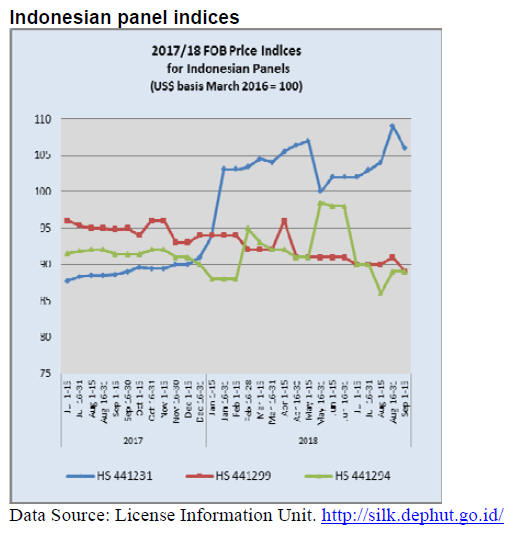
4.
MYANMAR
Multi Stakeholders Group for
VPA negotiations
The official commissioning of the Multi Stakeholders
Group (MSG) for VPA negotiation with EU was
conducted in Nay Pyi Taw on 7 September. The MSG
comprises 8 members from three key Stakeholders: the
Government, the Private Sector and civil society plus one
focal point from the Forest Department.
However, it is not clear how MSG will steer the VPA
negotiation as the UK has withdrawn support and is
reshape its assistance strategy.
Logs from Karenni National People’s Liberation Front
to processed
According to a local media source (BNI Media Group
Online Media) the Forest Department will officially
transport 3,000 tons of teak and 2,000 tons of other
hardwood logs which are stock piled in East Than Lwin.
Permission was granted by the National Reconciliation
and Peace Center (NRPC).
These logs had been extracted from the production areas
under the control of the Karenni National People’s
Liberation Front (KNPLF). Critics point out that this
exercise must be carefully monitored to ensure traceability
and the legality of the timber.
Efforts continue to boost economic development
A National Economic Coordination Committee was
formed recently to address widespread criticism of
government efforts on economic development. The aim of
the Committee is to formulate dynamic economic policies
and to assure the effective coordination among state
economic organisations.
According to Myanmar Investment Commission (MIC)
domestic investments reached around US$2 billion for the
period July 2017 to July 2018 and were mostly in the
areas of housing development and manufacturing.
According to the Myanmar Chamber of Commerce, local
investment focusses largely on import substitution.
Between April 2017 and March 2018 the MIC approved
222 new investments worth almost US$5 million. In
addition, the MIC approved 12 foreign investments worth
US$401.8 million for the Thilawa Special Economic Zone
Project. Total FDI reached US$6 million in fiscal 2018.
Log auctions
The Myanma Timber Enterprise (MTE) has announced the
tender schedules for the period 1 October 2018 to 30
September 2019. MTE plan to will sell 15,000 H. tons of
teak logs, 150,000 H. tons of non-teak logs and 2,200 tons
of teak sawnwood.
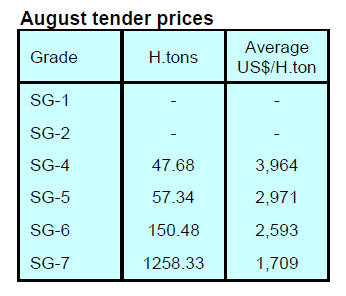
5. INDIA
Growth prospects good says World Bank
– but
reviving bank credit facilities a priority
The latest India Development Update from the World
Bank forecasts that the Indian economy is set to revert to
its growth rate of 7.5% in the coming years as it gets
beyond the fallout from the Goods and Services Tax
(GST) and the negative impacts of demonetisation.
The report says, while services will continue as the main
driver of growth, manufacturing is expected to accelerate
following the implementation of the GST. Despite the
recent momentum, the Bank says “attaining a growth rate
of 8 percent and higher on a sustained basis will require
addressing several structural challenges. India needs to
durably recover its two lagging engines of growth –
private investments and exports - while maintaining its
hard-won macroeconomic stability”.
One priority identified in the latest report is the need to
revive bank credit facilities to support growth. The Indian
banking sector suffers high balance sheet stress which can
be traced back to the period of exuberant bank credit
growth during 2004–08. The bank says “decisive reforms
will be needed to enable the Indian banking sector to help
finance India’s growth aspirations”.
See: https://www.worldbank.org/en/news/pressrelease/
2018/03/14/india-growth-story-since-1990s-remarkablystable-
resilient
GST - one year on
It is now one year since India introduced its standardised
Goods and Services tax (GST) system. The initial turmoil
and fears in the manufacturing sector have given way to a
general acceptance that, while not perfect, it is working
and there are signs of benefits but many issues remain to
be addressed.
One advantage for the central government is that more
business have sought registration and so come under the
tax umbrella. Business registration has expanded from 6.4
million enterprises before the GST to 11.2 million as of
July 2018.
One of the main issues raised by the private sector, apart
from the need to address tax rates, is the requirement to
register in all states where the company operates. This the
requirement for multiple registration has complicated
things for industry not made it easier. Companies fear that
multiple audits and assessments due to multiple
registrations will be an administrative burden and raise
costs.
Read more at:
http//economictimes.indiatimes.com/articleshow/64787124.cms?
utm_source=contentofinterest&utm_medium=text&utm_campai
gn=cppst
Plantation teak
Demand for imported plantation teak logs is steadily
coming back to life but importers are struggling with the
rising landed costs. To compensate for this prices to
endusers in the domestic market have been raised by
around 5%.
Credit facilities for importers still not been fully resumed
and this, the weak rupee and rising fuel costs are becoming
a burden.
The combined impact of a widening trade deficit, rupee
weakness and growing core inflation has resulted in the
reserve Bank of India (RBI) raising its key policy rate at
each of its last two bi-monthly policy review
meetings. Analysts write “as the US Federal Reserve is
showing no signs to slow interest rate hikes, further
monetary tightening by the RBI looks inevitable”.
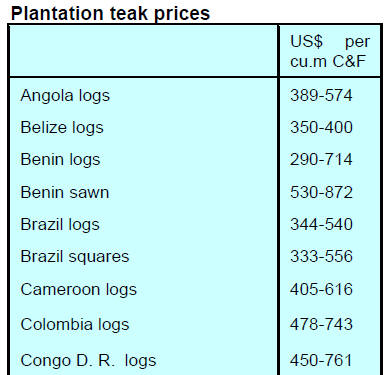
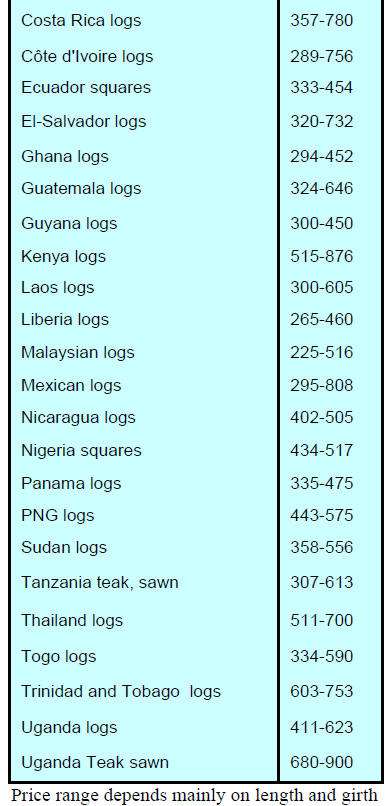
Locally sawn hardwood prices
As the realty market has started to improve the demand for
timber has also seen warming up. The imported costs are
rising due to weakening Rupee so to meet the situation the
sales prices have to be raised and the market has
responded to this need.
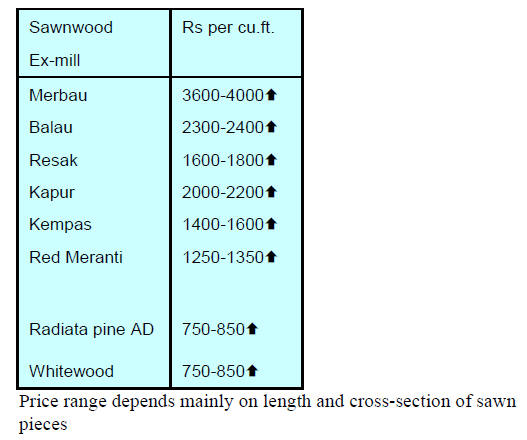
Myanmar teak
As activity in the building sector is rising demand for
Myanmar teak has finally come alive. The improved
demand has given millers the opportunity to raise prices.
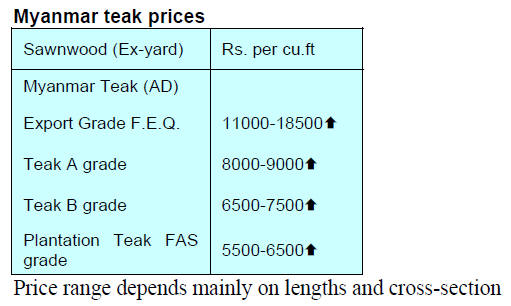
Sawn hardwood prices
No further prices increases have been reported.
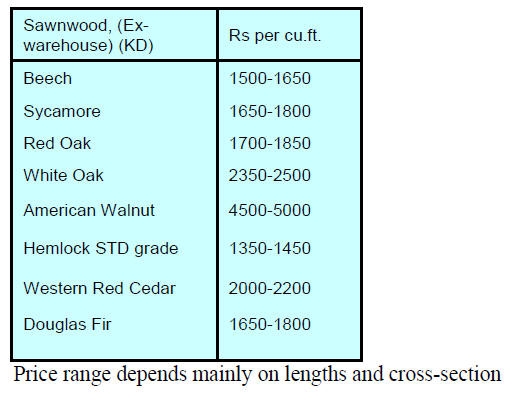
Plywood up-date
Given the firm demand in most sectors utilizing plywood
domestic producers have taken the opportunity to raise
prices in an effort to off-set rising production costs.
The earlier price increase has been accepted by consumers
and the latest increases will mean plywood manufacturers
can contain costs and profitability.
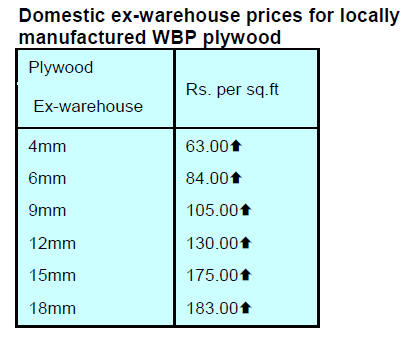
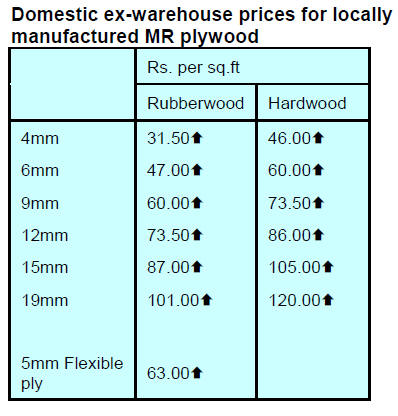
6. BRAZIL
Forest structure maintained
through controlled
harvesting
More than 32,000 trees have been logged in the past
decade in concessions in the Amazon Jamari National
Forest. The Jamari National Forest was the first in the
country where logging was controlled through government
approved management plans.
Of the entire Jamari National Forest area only around 30%
is available for harvesting and two companies won
concession rights for a 40-year period. All harvesting is
planned one year in advance and must be approved by the
Brazilian Institute for the Environment and Renewable
Natural Resources (IBAMA).
Investigations reported by the Federal University of
Rondônia illustrate that damage to the forest as a result of
harvesting quickly recovers.
Research has shown that after 3 or 4 years regeneration is
good and that the forest structure remains intact. The
Brazilian Forest Service controls extraction and has a
chain of custody mechanism through which wood sold by
the companies can be traced back to its origin.
Analysts write that around 70% of the timber harvested in
Jamari is for international markets. Since 2010, the
Brazilian government has collected R$44 million from
concessionaires harvesting public forests. Part of this
revenue is remitted to the states and municipalities in the
region where the companies operate.
Timber sector supports revival of construction sector
The Brazilian wood industries, through the representation
of the Brazilian Association of the Mechanically
Processed Wood Industry (ABIMCI), joined the ‘Coalition
for Construction’ set up by the Brazilian Chamber of Civil
Construction Industry (CBIC). This coalition brings
together 26 of the most important associations and
industry entities.
The objective behind this coalition is to unite efforts for
the development of measures to support the recovery of
Brazilian civil construction sector. One of the immediate
actions was the presentation of suggestions from the
productive sector to government.
The expectation is that the government will act to ensure
legal security, access to credit, and that there will be
planning and encouragement of private capital flows. For
ABIMCI, the participation of the wood industry in this
movement comes at an important time as it is a major
supplier to the construction industry.
ABIMCI has said that the timber sector faces low trade
competitiveness due to trade barriers, domestic
bureaucratic obstacles, port logistics that are the most
expensive in the world and low level of investment and
credit.
First half 2018 forestry sector exports rise
The Ministry of Industry and Foreign Trade (MDCI) has
reported that between January and June 2018 forestry
sector output grew significantly. Data from MDCI show
that first half 2018 exports of paper, woodbased panels
and pulp increased sharply rising to US$5.5 billion on the
back of firm demand in China as well as North America,
Europe and other Asia countries.
Market promotion with Mexico
ABIMCI recently hosted a visit by the president of the
Mexico-Brazil Chamber of Commerce (CAMEBRA). The
Chamber, located in Mexico City, is looking for business
opportunities between the two countries. The Brazilian
timber sector is one of the most attractive to Mexico
according to the president of CAMEBRA.
Mexican importers wish to identify Brazilian exporters
and this first meeting marked the beginning of
negotiations for a mutual cooperation agreement and a
memorandum of understanding between the two entities to
facilitate actions and promote more business in the timber
sector between the two countries. Plans are being made for
business to business meetings and trade missions.
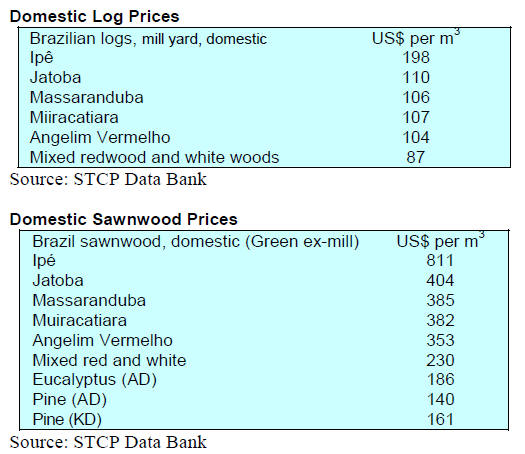
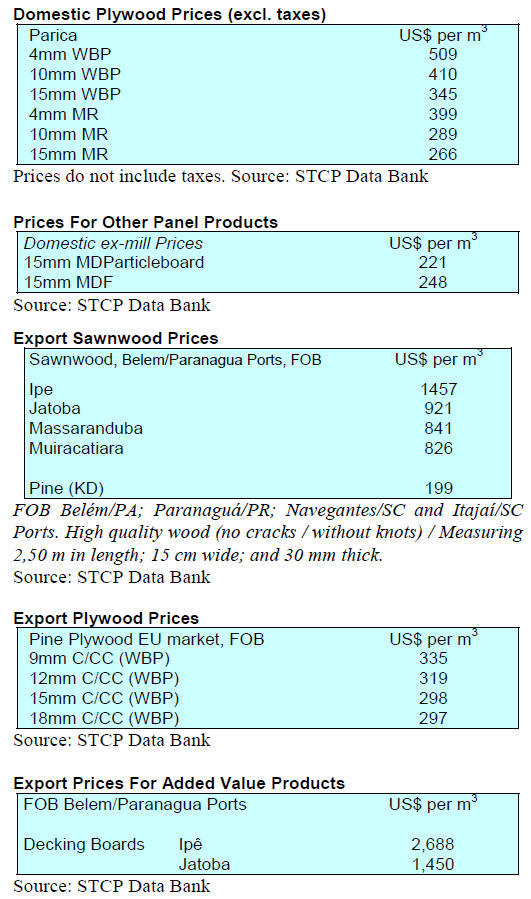
7. PERU
SERFOR gets cash to combat
illegal forest activities
The Ministry of Economy and Finance has authorised the
transfer of Sol 6.4 million to the National Forestry and
Wildlife Service (SERFOR) to finance surveillance
activities to combat illegal activities in the forest.
According to SERFOR the aim is to "strengthen the
actions of supervision and supervision of the legal origin
of forest resources and their preservation over time, in a
sustainable and safe manner". This is an approximate
translation of the text in supreme decree No. 198-2018-EF,
published in the Official Gazette El Peruano.
Minister - a significant part of Peru’s Amazon can be
commercially utilised
The Minister of Production, Raúl Pérez-Reyes, has said in
eight years Peru will double forestry and aquaculture
output pointing out that the value of production in these
two sectors went from US$600 million to US$5 billion
over the past 15 years.
Pérez said that almost 60% of Peru is Amazonian forests
and a significant part of this can be commercially utilised
which would provide for sustainability of the forest
resource. He mentioned also that it is necessary to
rehabilitate a significant part of the almost 8 million
hectares of natural forest lost to deforestation.
Surge in private investment lifts growth prospects
Peru’s economy continues to see significant growth in the
private sector. Investment is set to achieve a 5% increase
this year and forecast to increase 7.5% in 2019 according
to the Ministry of Economy and Finance.
According to Andina, the state owned news agency,
private investment will be one of the major drivers of the
economy next year. Andina reported that there has been
significant expansion of private investment reversing 14
quarters of decline.
